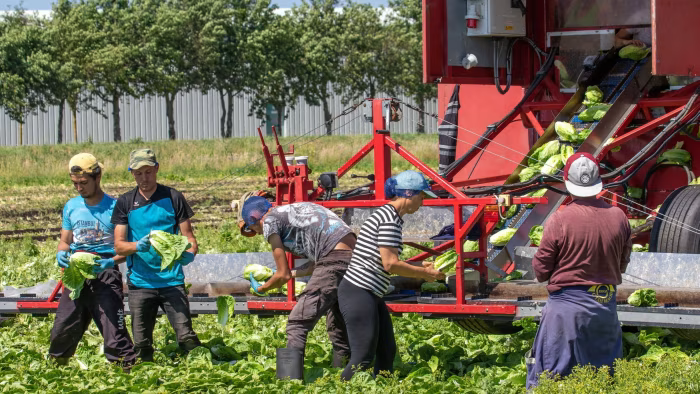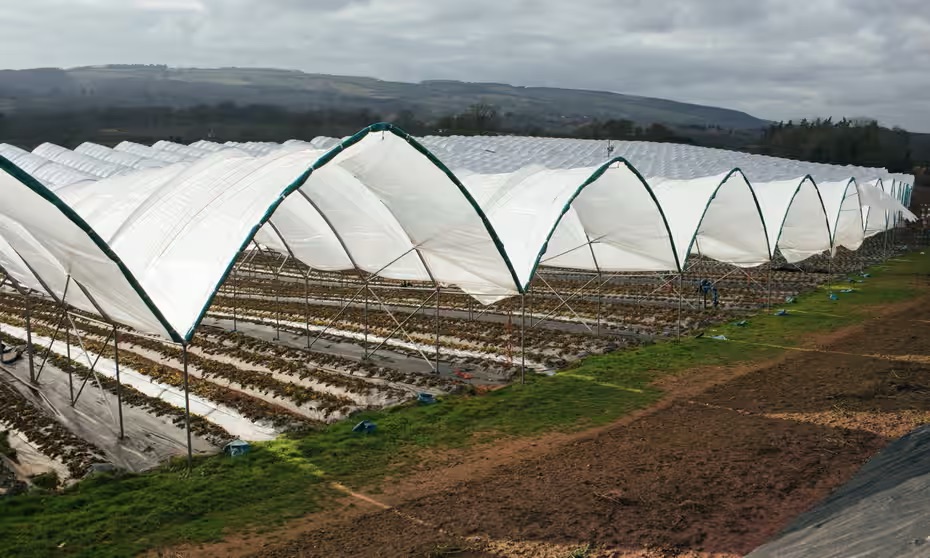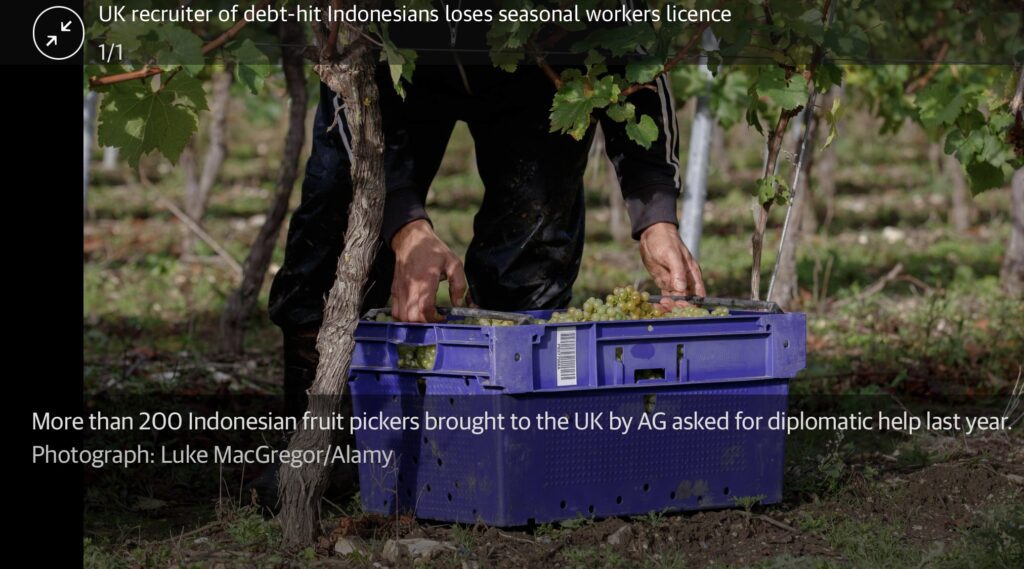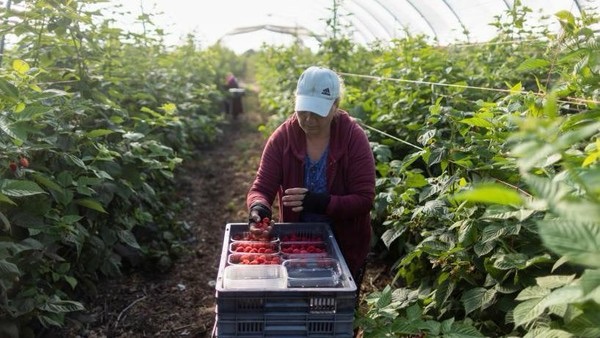21st July 2024: Guardian Exclusive Investigation – Indonesians who paid thousands to work on UK farm sacked within weeks
Indonesians who paid thousands of pounds to travel to Britain and pick fruit at a farm supplying most big supermarkets have been sent home within weeks for not picking fast enough.
Original source: The Guardian by Emily Dugan – 21st July 2024
One of the workers said he had sold his family’s land, as well as his and his parents’ motorbikes, to cover the more than £2,000 cost of coming to Britain in May and was distressed to find himself unemployed with few possessions.

The labour exploitation watchdog is investigating allegations that he was one of several workers charged illegal fees of up to £1,100 by an Indonesian organisation claiming it would get them to the UK faster.
In Indonesia the worker earned about £100 a month selling food and said his parents were “very disappointed” as he had sold everything for a shot at helping his family. He said: “I feel confused and mad and angry about this situation. I have no job in Indonesia [and] I’ve spent all my money to come to the UK.”
The Guardian has spoken to four of the dismissed workers and in three cases seen evidence of apparent fee payments to a third party in addition to the more than £1,000 transferred for flights and visas to the licensed recruiters.
—
Also see Fruitnet 6th Aug 2024: Indonesian picker allegations highlight risk of exploitation for seasonal workers
—
The allegations of illegal fees being paid in Indonesia raise questions about the risk of exploitation in the seasonal worker scheme, which allows workers from foreign countries a six-month visa to work on farms but makes them bear all the financial risk.
The Guardian understands the new immigration minister, Seema Malhotra, will look into exploitation in the work visa system to clamp down on exploitative practices. The Migration Advisory Committee recommended on Monday that seasonal visas should continue to “ensure food security” but that they should include more protections, such as guaranteeing at least two months of work.
—
Additional Reading:
Kumparan News 25th July 2024: Impact of 5 Indonesian Citizens Fired in England, PT Mardel Will Be More Selective in Recruiting Prospective PMI/Imbas 5 WNI Dipecat di Inggris, PT Mardel akan Lebih Selektif Rekrut Calon PMI
Kumparan News 25th July 2024: Allegations of Extortion by Indonesian Migrant Workers Who Pick Cherry: Company Denies, Ministry of Manpower Seeks Solution/Dugaan Pungli TKI Pemetik Ceri: Perusahaan Bantah, Kemnaker Cari Solusi
Kumparan News 24th July 2024: PT Mardel Denies Extortion of Indonesian Cherry Pickers in England, Ready to Compensate/PT Mardel Bantah Pungli ke WNI Pemetik Ceri di Inggris, Siap Ganti Rugi
Kumparan News 24th July 2024:
Commission IX Asks Government to Help Indonesian Citizens in England Suspected of Being Victims of Extortion
—
Haygrove, a farm in Hereford that supplies soft fruit to British supermarkets, gave the man and four other workers warning letters about the speed of their picking before dismissing them between five and six weeks after they started work. They were booked on a flight home by their recruiters the next day.
The workers said the targets at the farm in Ledbury included picking 20kg of cherries an hour. Another of the sacked pickers said: “It was very hard to meet the target because day by day there was less fruit.”
He said he borrowed money from “the bank, friends and family” and that he was still more than £1,100 in debt. “Why have I ended up like this? Now I’m in Indonesia with no job … It’s not fair for me because I’ve sacrificed so much.”
Beverly Dixon, the managing director of farming at Haygrove, said the farm had consistently had to make up the men’s wages because of poor performance and had supported them to try to improve. She said targets were “set based on achievable standards with the majority of pickers sometimes achieving more than double that speed”.
The five men only arrived in Britain in mid-May and were all dismissed from Haygrove on 24 June, having earned between £2,555 and £3,874. Once the cost of coming to Britain – as well as living costs – were taken from this, several said they were left with significant debts.
Two of the men ran away to London and refused to board flights home booked for 25 June. They have now been given new jobs in a packhouse after an intervention by a migrant welfare activist.
Andy Hall, the migrant labour rights specialist who intervened on behalf of the men, said: “This scandal shows once again that the entire burden of shouldering the multiple risks associated with the seasonal workers scheme in the UK is placed not on supermarkets, farms, scheme operators or other supply chain actors but on vulnerable workers from overseas.”
A Gangmasters and Labour Abuse Authority investigation was opened last month. It is understood to be focused on allegations over the illegal charging of fees in Indonesia.
Dixon said Haygrove was “deeply concerned” to hear of the “alleged financial challenge faced by the Indonesian workers, particularly if one or more paid an illegal recruiter in Indonesia” and the farm was fully supporting the GLAA investigation.
The Guardian revealed that Indonesians were coming to Britain with debts of up to £5,000 to unlicensed foreign brokers in 2022. The debts were to third parties, and AG, the British agency that officially recruited them, lost its licence as a seasonal worker sponsor.
Since then, Indonesia had been considered a risky country to recruit from, but the route was reopened this year by a new UK recruiter, Agri-HR. It worked in partnership with the Indonesian agent PT Mardel Anugerah, which also secured a licence to recruit to Britain, and was being supported by the Indonesian embassy.
However, workers allege a third party in Indonesia, Forkom, which appears to be a communication hub for Indonesians trying to work abroad, recruited workers and charged fees, saying it could get them to Britain faster. It is illegal to recruit without a licence under UK and Indonesian law.
Agri-HR said: “On hearing these allegations, Agri-HR immediately contacted the GLAA with the request to investigate these claims. The GLAA interviewed some workers that same day and are continuing with their investigations and further worker interviews have taken place and are scheduled.”
Workers told the Guardian that Forkom was encouraging its members to put pressure on the families of the dismissed pickers who ran away, with one saying his family in Indonesia was visited at home at 3am.
In messages to a Forkom WhatsApp group of recruited workers, its chair, Agus Hariyono, encouraged those still in Indonesia to put pressure on the men who had run away in Britain by going to their family homes. In a follow-up video call to members, he then allegedly asked workers to delete records of any money paid to Forkom.
Hariyono said his organisation was a social forum set up for Indonesians with seasonal worker visas after some did not return from the 2022 season, meaning the visa route was closed down. He said one worker “entrusted funds” to Forkom but that “this was intended as a deposit” and the funds were returned to his account to pay PT Mardel Anugerah directly.
Hariyono said it conveyed messages to families to encourage those who were dismissed to return to Indonesia and prevent a repeat of the 2022 season where one in five overstayed their visa.
Delif Subeki, of PT Mardel Anugerah, said his recruitment agency was introduced to Forkom by the Indonesian ministry of manpower and made a commitment to “give priority” to members. Subeki said it “clearly informed” applicants that it was not using any third parties for recruitment and that no fees should be paid.
Financial Times 16th July 2024: UK food sector should cover migrant workers’ upfront costs, advisers say

UK immigration: Migration Advisory Committee urges government to do more to stamp out abuses in seasonal worker scheme
Sourced from: Financial Times Delphine Strauss and Oliver Telling – 16th July 2024
The UK food industry should cover the upfront costs faced by migrant farm workers if it wants to keep access to the overseas labour it relies on, the government’s advisers on migration have said.
Farm workers coming to the UK are at risk of debt bondage because they often borrow money to cover flights and visas without knowing what they will earn, a report by the independent Migration Advisory Committee found.
To maintain current levels of food production, there was no immediate alternative given a lack of willing UK recruits to the seasonal worker scheme (SWS), the report published on Tuesday said, urging ministers to give industry certainty over the scheme’s future.
However, the report also said the industry and government had not done enough to stamp out abuses of workers’ rights in a scheme where they faced “an inherent imbalance of power” against employers.
The SWS allows UK growers to hire around 45,000 people a year on six-month visas.
The previous Conservative government said in May that the programme would run at least until 2029 but noted the aim would be to taper its size over time, while encouraging farmers towards automation.
Ministers should confirm visa numbers each year on a rolling basis, so the industry would in effect “have five years’ notice if the scheme were to be closed”, the MAC said.
Labour pledged before the general election on July 4 to reform the immigration system with a view to reducing overseas hiring, by making employers’ access to visas conditional on greater efforts to train UK workers.
However, it has not yet said what this will mean in practice or proposed any changes to the SWS.
But workers also need more certainty over how much they will earn, the committee added, calling for a guarantee of at least two months pay, to ensure they could recoup the costs of coming to the UK.
It urged the industry to accelerate action to move to an “employer pays principle”, so that recruitment and relocation expenses are borne by employers rather than workers.
An industry task force, including supermarkets, growers and recruiters, has said it will model waysan EPP model could work. But it has made slow progress because there is no consensus on how to share costs along the supply chain, given the tight margins imposed by retailers on UK growers.
The MAC said the task force needed to work faster and urged it to set a timeframe to present proposals. Ministers should then confirm the scheme’s continuation only if this timeframe was met, it said.
Recommended UK employment: Britain’s seasonal worker scheme leaves many migrants in debt, research finds
The committee noted that the government and employers needed to do more to inform workers of their legal rights and to enforce them through proactive inspections. It also called for a clearer process to refund income tax and help workers opt out of pension auto-enrolment.
Workers’ rights campaigners welcomed the committee’s recommendations. “All the risks of the seasonal worker scheme are on the workers, all the costs . . . It’s really important the government takes heed of this,” said Andy Hall, a migrant rights campaigner who has worked with the industry’s Stronger Together task force.
A government spokesperson said it would “carefully consider” the MAC’s findings and respond in “due course”.
Sophie De Salis, a sustainability policy adviser at the British Retail Consortium, said the task force’s study would be “a vital step” to understand how the EPP could be applied in practice.
It urged the government to adopt the MAC’s recommendations but also to scrap visa fees, arguing that these “heighten the financial risk to workers from the outset”.
The industry’s SWS task force said it acknowledged the committee’s call for its study to be conducted in a timely manner and was working closely with the Department for Environment, Food and Rural Affairs on the jointly-funded project.
Additional Reading
Independent 2nd June 2024: Vulnerable workers coming to UK in post-Brexit deal at risk of bullying and sexual harassment, report finds
Independent 29th May 2024: UK ministers pressed ahead with seasonal worker visa scheme for migrants despite UN experts’ warning of forced labour and human trafficking risks
Bureau of Investigative Journalism 29th May 2024: Government expanded visa scheme weeks after UN raised alarm over people trafficking
BHRRC 23rd May 2024: UK – Leading supermarkets asked to meet costs of implementing the Employer Pays Principle across supply chains by civil society group (see 9th May 2024 below); incl. company responses
Bloomberg 22nd May 2024: Fruit Picker Who Said Her Hands Bled From Work Sues UK Employer
Seasonal Worker Scheme Taskforce Update 17th May 2024: SWS Taskforce update on Employer Pays Principle study
GROCER 10th May 2024: SOURCING Workers’ groups call on supermarkets to pay seasonal labour fees – The groups said there are risks farmers will be unable to comply to new rules
Guardian 9th May 2024: UK Government says employers may be required to pay travel and visa costs for people getting seasonal worker visas
9th May 2024: Landworker’s Alliance and Allies call for UK supermarkets to pay recruitment related fees and costs for migrant workers
April 30th 2024: BBC World –England again employs seasonal fruit pickers from Indonesia (translation)
The Grocer 30th Apr 2024: Growers brace for up to £90m in additional seasonal worker costs in UK in move towards internationally compliant zero cost responsible recruitment model for vulnerable migrant workers
3rd April 2024: Financial Times (London) UK employment – Britain’s seasonal worker scheme leaves many migrants in debt, research finds
3rd April 2024: Independent – Migrant fruit pickers saddled with debts of up to £5,500 to come to UK through government scheme
26th January 2024: UK Seasonal Worker Scheme Modern Slavery Issues: Indonesian seasonal fruit pickers landed in debt bondage challenges Home Office
26th Jan 2024: ATLEU – UK government fails to protect workers from trafficking and exploitation
26th Jan 2024: ATLEU – Challenge to government’s Seasonal Worker Scheme
25th Jan 2024 Home Office: UK government survey on experiences of seasonal workers scheme confirms the exceptionally high levels of issues (confusion, fees etc) faced by Indonesian and Nepali workers in 2021/2022
24th Jan 2024: ATLEU – Seasonal worker recognised as a potential victim of trafficking
12th January 2024: UK government ‘breaching international law’ with seasonal worker scheme, says UN envoy
FLEX 26th Oct 2023 – Seasonal Workers’ Rights; Who’s Responsible?
21st July 2023: Vulnerable UK migrant workers at risk as audits of farm recruiters stall
17th March 2023 BHRRC Blog Series: UK Seasonal Worker Scheme Endangers Vulnerable Foreign Workers. (My Op Ed)
23rd February 2023: Farm workers on UK seasonal visas to be guaranteed 32 hours a week
Other stories on challenges of UK seasonal worker scheme
1. Working in the UK: Hundreds of Indonesian Citizens Escape, More Than 1,200 Workers from Indonesia Threatened to Cancel (BBC, 16th Feb 2023)
2. AG Recruitment, UK recruiter of debt-hit Indonesian and Nepali migrant workers, loses seasonal workers scheme license following forced labour related allegations, worker abscondments and asylum claims (Guardian, 10th Feb 2023)
3. Indonesian former fruit pickers become illegal immigrants and asylum seekers in the UK – ‘This is the easiest shortcut’ (BBC, 26th Jan 2023)
4. Home Office accepts recommendations in Chief Inspector’s report on immigration system as it relates to the agricultural sector (Freeths, 16th Jan 2023)
5. Immigration: Investors warn food companies about risk of forced labour on UK farms (Financial Times 19th Dec 2022)
6. Investor statement on the UK Seasonal Worker Scheme (Public Investor Statement 19th Dec 2022)
7. Hundreds of Indonesian fruit pickers in UK seek diplomatic help (Guardian, 2nd Dec 2022)
8. Seasonal worker visa puts migrants at risk of exploitation, say supermarkets (Guardian, 2nd Dec 2022)
9. Seasonal fruit pickers from Nepal left thousands in debt after being sent home early from UK farms (Guardian, 13th Nov 2022)
10. Indonesia to investigate claims fruit pickers in UK seasonal agricultural workers scheme charged thousands to work in Kent (Guardian, 29th Aug 2022)


